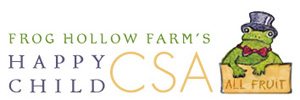In the past seven years, the Berkeley Urban Bee Lab has helped Frog Hollow seed 20 acres of our farm with over 500 individual plant types. They have successfully grown the population of native bees on our farm from 20 species to 46 species! But it has not been an easy venture.
The surrounding landscape has a huge impact on the number of bee species attracted to an area. Native bees are constantly searching for new floral resources. Frog Hollow is surrounded by monocultures, an agricultural practice of producing a single crop, on every side with no weeds. Weeds are great for the survival of native bees. Even though Al has created a biodiverse farm, within a half a mile radius there is no biodiversity. Unlike his surrounding neighbors, Al leaves weedy species and doesn’t spray pesticides or herbicides, so Frog Hollow has become an island for native bees. Bees have to venture further to reach Frog Hollow, so it has taken the Bee Lab longer to attract native bees to this area. As urban neighbors this is where we can help!
If we, at home, planted small home gardens with bee attracting plants, we could help make the venture for bees to get to farms easier. Creating surrounding landscapes that attract bees means more pollination, so think about the impact the residents of Brentwood could have on Frog Hollow if every person grew a bee garden! The Berkeley Urban Bee Lab has compiled a plethora of resources for urban citizens of the Bay Area to utilize in order to help save our native bees. Their plant list takes into consideration not only seasonal changes, but also the availability of these plants in local nurseries. What a good opportunity for urban and agricultural communities to come together in support of the future of our food system!
The UC Berkeley Urban Bee Lab is not done with their work at Frog Hollow. They have discovered that some specific bee species, like Andrena Bees, are good orchard pollinators — which is very helpful for our yummy apple and cherry trees. They now hope to grow the presence of these specific species by planting vegetation that attracts them. In addition, they hope to continue to further refine what they know about how specific plant species affect specific bee species. They will continue adding and refining the habitat and compile resources for Farmer Al to sustain the habitat on his own. The Partnership between Frog Hollow and the Bee Lab has been fruitful by attracting more bees, identifying species of bees that will help Frog Hollow flourish, and by gathering data that will help other farmers.
More people are becoming aware and educated on the importance of pollinators, but it is our job as urban residents to continue raising awareness about how we can care for our native pollinators. Both urban and agricultural communities have so much to give to each other, so it is imperative that we continue to work together and learn from each other. We are so grateful for the impact the Bee Lab has made on our farm and hope you will consider joining the effort to help create a pollinator pathway in your own communities and gardens. For more information about the UC Berkeley Urban Bee Lab, their research, and their plant list, please visit www.helpabee.org.

 Follow
Follow
